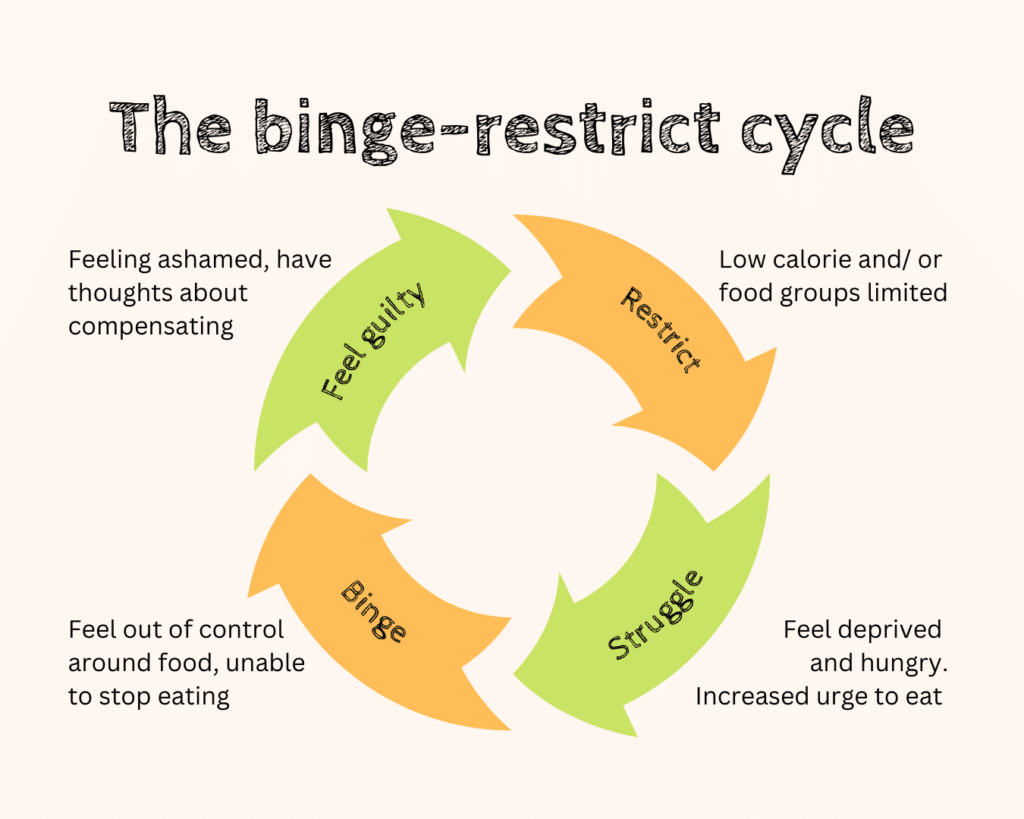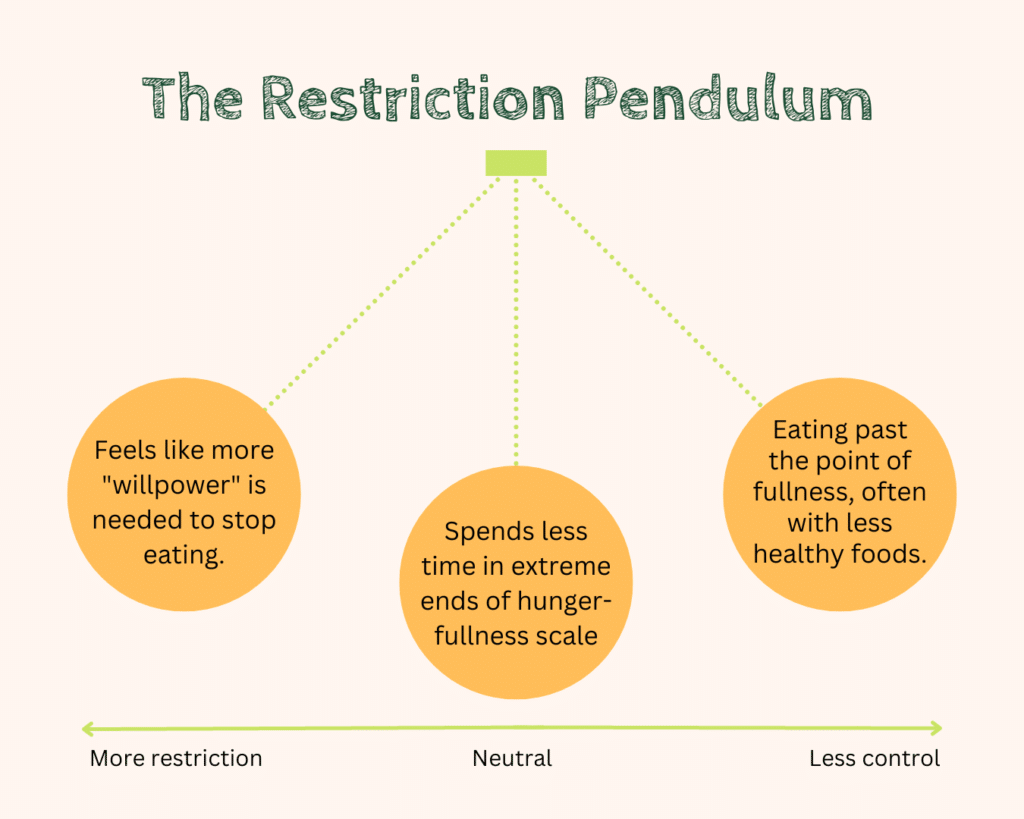Binge restrict cycle: how to break it
What is the binge-restrict cycle?
The binge restrict cycle is a scenario where someone finds themselves caught between periods of restricting foods, followed by bingeing and back to restriction. It can feel distressing and can be a tricky cycle to escape. This cycle can be a feature of binge eating disorder, bulimia and anorexia too. It can also feature in disordered eating patterns. Even though it is so common, it is also poorly understood. A huge amount of self compassion and kindess is needed when working through this due the shame and guilt associated with it.

What does restriction look like?
- Reducing portions and the amount of food eaten in a day
- Dieting
- Cutting out food groups
- Not allowing the foods you love in your diet
Restriction comes in many forms. Although restriction of the amount of food is probably the one we think of most, restriction can be much broader. For example another common form is cutting out food groups or certain foods. This can be done in the guise of health or ethics, such as cutting out dairy or all animal products, gluten, carbohydrates etc. There can be mental restrictino where some foods are seen as “good” and others as “bad”. As these restrictions can be normal for some people, this form of restriction can be hidden, or even socially acceptable. Diet culture can normalise it. This stage could last for days, weeks or even months and be associated with lots of praise from others.
During this stage it is common to feel deprivation. You may be more obsessed with food, constantly thinking about it and always looking at recipes, TV shows, food images. It can affect mood and your sense of wellbeing leading to fear, anziety and being withdrawn. Eventually you “hit the wall”. The cravings grow louder and stronger and overtake your thoughts.
What does a binge look like?
- Overeating food
- Eating a specific food group to excess
- Feeling out of control around food and being unable to stop
- Eating until you feel sick
How many calories are in a binge?
This is hard to say but as an estimate most binges will be move than 1000kcals in one episode. This could be up to 10,000 kcals in one day long binge.
The clinical definition of a binge is a:
- Period of time (e.g. an hour or two) where some one eats an amount of food that would be considered. to be significantly more than what someone else would eat in a similar timeframe and scenario and;
- A feeling of a lack of control in these episodes including feeling unable to stop
Specifically, binge eating episodes are associated with three or more of:
- Eating much more rapidly than normal
- Eating until feeling uncomfortably full
- Eating large amounts of food when not feeling physically hungry
- Eating alone because of being embarrassed by how much one is eating
- Feeling disgusted with oneself, depressed, or very guilty after overeating
However, you may also experience episodes that you might consider to be a binge even if they don’t precisely fit this definition. These experiences are still valid and important.
If you are someone who experiences a binge, you may have cravings, have feelings of shame and guilt. You might hoard food, rapidly eat large amounts of in a short time and feel out of control.
What are the side effects of the binge-restrict cycle?
Often after binges, there can be huge feelings of guilt and shame. These can feel overwhelming and lead to a desire to compensate for the binge. Compensatory behaviours are where someone tries to lose or burn additional calories to make up for what they’ve eaten. This may include misuse of diuretic or laxative medication, over-exercise or even purging (vomiting). These compensatory behaviours can be very harmful to the body. Because the calories lost during compensatory behaviours can be less than those eaten during a binge, weight loss doesn’t always occur. This can mean loved ones might not notice that anything is wrong.
- Diuretic and laxative misuse
- Over exercising
- Purging (making yourself sick)
- Not eating your normal meals after a binge, going back to restriction
Side effects of the binge-restrict cycle can include medical problems with your blood results, potentially impacting your heart and your metabolism. There can also be impacts on your mood and emotions as well as your overall sense of well-being.
If you, or someone that you know is bingeing as well as purging, they may need support for bulimia. You can read more about bulimia here, or reach out to your GP for referral services.
Why you have binges after restriction

Think of your likelihood of bingeing being like a pendulum on a swing. When you restrict, it is like you are pulling that pendulum to one side. The more you restrict, the tighter and higher you pull it. The more you pull, the more resistance you’ll feel as your body tries to stop restriction, just like how gravity acts on the pendulum. Eventually, you will have to let go. However, a pendulum won’t settle immediately back in the centre, but will swing to the other side. Similarly, you are likely to overeat and feel out of control around food after restricting.
In fact, restriction can be one of the biggest predictors of future binges. It may sound counterintuitive, but stopping restriction and allowing yourself unconditional access to food can be a key part of binge eating recovery.
Risk signs of the binge restrict cycle
Some signs of binge eating to look out for in loved ones include:
- Buying or hoarding large amounts of food
- Eating rapidly and outside of hunger cues
- Organising life around food and eating opportunities
- Avoiding eating around others
- Weight gain and bloating
- Issues sleeping
- Poor skin
The binge restrict cycle in anorexia
Although it seems counter intuitive that bingeing can occur alongside anorexia, it can be surprisingly common during recovery.
After an extended period of extreme restriction, your body may be more likely to binge in an attempt to regain weight and protect itself with extra energy reserves. If we go back to the restriction pendulum, anorexia is a bit like leveraging the pendulum as far and high as it can go, creating lots of space for it to swing back.
During recovery from anorexia, something called hypermetabolism can occur. This is where the body needs extra energy and nutrition to heal and restore, at much higher levels than a typical adult’s calorific requirements. In fact, this can be as high as 4000 kcal per day, just to maintain weight.
Going from a very low calorie, heavily restricted diet to a plan designed to help you regain weight and keep up with hypermetabolism can feel very out of control. Whilst you juggle these, plus relearn hunger cues, bingeing can occur.
Keep your healthcare team updated with your experiences around food so that they can properly support you, and remember that reducing restriction will help to reduce binges in the future as you recover.
The binge restrict cycle in bulimia recovery
In bulimia, bingeing behaviours already exist, alongside compensatory behaviours like purging. Restriction perpetuates the cycle of bingeing and purging. Because of this, reducing restriction is an important part of recovery.
Treatment for bulimia in adults is usually based on guided self-help, which can help to work on your binge-restrict cycle, as well as any underlying reasoning behind bulimia.
What to do after a binge
- Remind yourself that you are still worthy of kindness and self compassion. This is a huge key. You are not a bad person for bingeing or for restricting.
- Return to a “normal” meal pattern as soon as possible afterwards. There is no need to compensating for your binge, this will just drive you round the cycle again.
- Avoid adding in new food rules (especially not the rule: “I must not eat the food that I just binged on!”)
- Have a social media detox -stay off social media, or at least unfollow accounts that make you feel bad. Less “washboard abs”, more cute animals and positive content!
- Try not to purge, use laxatives or engage in other compensatory behaviours -these can all perpetuate the cycle
- Try an engaging activity such as reading, craft, drawing or another (non-compensatory) hobby so you aren’t left thinking about your binge
- Build a self-soothing toolkit. Have a list of activities that help you to feel calmer, safer and comforted. You could put in affirmations to read, stress balls and fiddle toys, a weighted blanket, a craft to do. Hot baths always get suggested, but why not try breath work, facial massage, journalling or a grounding technique instead.
How do you break the binge restrict cycle?
This is something that will take time, practise and you are likely to have relapses. Being prepared for these happening can help. You have not failed everytime you have a binge. The key is to learn from each one and reflect on the what, the why, the where and the when. What you ate, why you think it happened, where you were and when – was the timing of meals and the day part of it? Like learning any new skill it takes time and practice.
Practical tips to help stop the binge restrict cycle:
- Stop retricting yourself of food and types of foods.
- Make sure you eat enough througout the day, eating 3 meals and 3 snacks will help you.
- Plan out what you will eat at your meals and snacks, prepare in advance and have food with you if you go out.
- Learn about all foods being good for you in moderation. There is no good or bad food.
- Use mindfullness as a way to help calm the nervous system and to help you stay in the moment.
- Think through how to deal with stressful situations and emotions without food. This may need therapy.
Other tips for bulima recovery
At Dietitian UK, we offer specialist dietitian support for eating disorders and disordered eating, including bulimia and binge-restrict cycling. You can find out more or book in for support here.
Please do reach out to someone if you are struggling or have concerns. It can be a loved one, healthcare professional or someone else that you trust. Recognising that you are facing eating difficulties is an essential first step for building a better relationship with food.